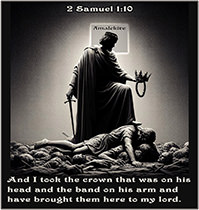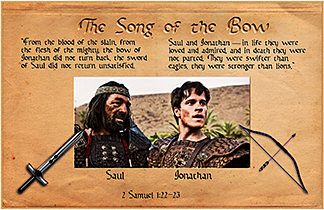This 6-minute video provides an overview of the book of 2 Samuel, compliments of BibleProject.
2 Samuel 1:1–27 . . . Bible Study Summary with Videos and Questions
“David’s Lament for Saul and Jonathan”
This second book continues the story begun in 1 Samuel. It records how David became king of Israel after Saul's death. While Samuel was the main character in the first book (hence its name), David will dominate the pages of Second Samuel. Both books are intricately connected, not just because they bear the same name and were undoubtedly one book in the beginning, but also because of what they reveal about the character of numerous individuals in this narrative, and what they certainly tell us about Father God.
The overall theme of 1 Samuel highlights the transition of the people of Israel from a loosely formed federation of tribes to a united monarchy. It accomplished this through exciting stories of battles, intrigue, and love. Second Samuel shows the sovereignty of God in establishing the house of this monarchy. In our study, we'll see that good leaders, while hard to find, can often embody the qualities of good as well as evil.
Within these pages of 2 Samuel, many lessons can and should be learned. First and foremost, the author believed that God was intimately involved in the lives of many of Israel's individuals and certainly its communities. People saw the hand of God in every event that occurred. Their stories, then, are told from the point of view of God being present with them (albeit silently at times), of having made a covenant with them, and of having revealed himself to them, generally, speaking only to and through his prophets. Everything the people do they do in relation to God. Ultimately, though it seems like the leaders are making decisions and dominating the action, in reality it's God who determines the outcomes.
[Note: Click the link to This Week’s Passage near the bottom of this page to read today’s Scripture.]
There are four primary segments in this 2 Samuel narrative: (1) The question of Saul's successor: 1:1 through 5:10; (2) David's reign: 5:11 through 8:18; (3) David's family: 9:1 through 20:26, and (4) David's death: 21:1 through 24:25. We'll start now with segment 1.
An Amalekite’s Account of Saul’s Death (2 Samuel 1:1–16)
Let's begin by reading the first sixteen verses of the opening chapter. . . First Samuel 31 and 2 Samuel 1 record the transition that took place in the royal leadership of Israel. Many students of these passages believe that 1 Samuel 31 contains the factual account of Saul's death while others believe that the Amalekite killed Saul. Josephus (a first-century Roman-Jewish scholar and historian) blended both accounts in the following description.
"But his [Saul's] armor bearer, not daring to kill his master, drew his own sword, and, placing himself over and against its point, threw himself upon it; and when he could neither run it through him, nor, by leaning against it to make the sword pass through him, he turned him round, and asked a certain young man that stood by, who he was; and when he understood that he was an Amalekite, he desired him to force the sword through him, because he was not able to do it with his own hands, and thereby to procure him such a death as he desired. This young man did accordingly . . ." — Flavius Josephus, Antiquities of the Jews
Having read this second account of Saul's death, it's possible that the young Amalekite must have been a mercenary soldier who'd joined Saul's army. It seems more likely that this man's account of Saul's death wasn't accurate, rather that he'd had only a hand in killing Saul. However, it's possible that his account was true, and that, after Saul fell on his spear, he didn't die immediately and so asked the Amalekite to finish him off. While the text isn't fully informative, we're told that the young Amalekite was able to take Saul's crown and bracelet, probably returning them to David with his story to curry favor with him.
Note: Because Mount Gilboa stood some 80 miles north of Ziklag, it probably took the young man three or four days to make the trip. The average traveler in Bible times would normally cover about 20 miles per day walking. (Imagine: It's 20 miles from Arnold to Angels Camp.) Ironically God had commanded Saul to "annihilate the Amalekites" (1 Sam. 15:3); David had just returned from slaughtering a portion of them (v. 1); now one of them claimed to have killed the king who'd disobeyed God by not killing all of the Amalekites.
David asked the Amalekite who he was (v. 8), and the young man explained that he was "an Amalekite." He undoubtedly thought David would have been glad that Saul had finally died, since Saul was David's rival for the throne. For about 10 years, David had a price on his head and had been running from Saul. However, the news of Saul's death saddened David because Saul was "the Lord's anointed." This phrase emphasizes the close relationship between Yahweh and the king. Furthermore, David's soul-brother Jonathan had died, as had many other Israelite soldiers.
Because David believed the young Amalekite soldier's story, he must have had him executed. "Your blood is on your own head" (v. 16) means the blood you've shed is the cause of your own death. David had previously had at least two opportunities to kill Saul, but he hadn't done so because Saul was, in fact, "the Lord's anointed" (1 Sam. 24:1–7; 26:1–11).
We must remember and appreciate the fact that it would have been dangerous for David to execute the Amalekite, since David was then residing in Philistine territory. His Philistine neighbors would have interpreted any show of sorrow over Saul's death as treasonous. However, David was once again willing to risk danger to do what was right. It was time for him to make a hearty effort to break away from the Philistines and return to his nation, Israel.
It was on the third day after David and his men returned to Ziklag, after their victory over the Amalekites, that a messenger arrived with news of Saul’s and Jonathan’s deaths. David asked and the messenger explained how wounded Saul had asked him to finish him off (v. 10). The young Amelikite probably expected to receive a reward from David for his mercy-killing of Saul and for bringing to David the king’s crown and armband. He probably believed that his act would be seen as a great service. He was probably operating under the assumption that David, Saul’s rival and designated successor, would be grateful for the removal of his greatest obstacle to the throne. But the young man badly misjudged David’s reaction. Instead of rejoicing, David instinctively mourned (vv. 11–12).
Even when Saul had acted unrighteously, David had resisted slaying him, even though he'd had two opportunities to kill him outright. This Amalekite opportunist’s decision to take upon himself Saul’s killing was an abomination to David! Being an Amalekite probably didn't help, since David has just finished slaying hundreds of Amalekites whom he considered to be “enemies of God’s people.” It’s possible that the Amalekite wasn’t telling David the truth. He could have simply stripped Saul’s body so he could bring the king’s crown to David while seeking rewards for his efforts.
David Laments the Deaths of Saul and Jonathan (vv. 17–27)
17David took up this lament concerning Saul and his son Jonathan, 18and he ordered that the people of Judah be taught this lament of the bow (it is written in the Book of Jashar): . . . (2 Sam. 1:17–18).
Laments over the deaths of individuals aren't uncommon in the Old Testament (cf. 1 Kings 13:30; Jer. 22:18; 34:5; Ezek. 28:12–19; 32:2–15). [Note: The Book of Jashar that v. 18 references is no longer existent.] Students of David's lament over Saul and Jonathan's deaths have called it “The Song of the Bow” (cf. v. 22), which is a heartfelt elegy. This sorrowful poem expresses David’s deep grief for his friend Jonathan and his respect for the fallen King Saul, who was also his father-in-law and adversary.
We'll soon see David's remaining two laments over an individual's death recorded in Scripture: one for Abner, Saul's commander-in-chief (3:33–34); the other for David's son Absalom (18:33). We're told in this chapter's v. 18 that many people in Judah learned about and then sang David's lament over Saul and Jonathan's deaths.
"How the mighty have fallen" is the key refrain in the song (vv. 19, 25, 27). Let's now take a few moments to read David's amazing psalm that he wrote in honor of Saul and Jonathan. Note how gracious he was, even to Saul who'd sought to kill him. He looked beyond Saul's dark and troubled side to his greatness as Israel's warrior and king. Look carefully at all three segments of David's "Song of the Bow." Segment 1 of David's lament lauds the fallen heroes, mourns their deaths, and praises their bravery, inseparable love, and Saul's virtues (vv. 19–24); . . . Segment 2, which expounds David and Jonathan's friendship (vv. 25–26); . . . Segment 3: David's final sigh of grief (v. 27).
Ah, there’s a powerful and evocative line from David’s lament! When v. 23 says, “Saul and Jonathan, beloved and lovely! In life and in death they were not divided; they were swifter than eagles, they were stronger than lions,” it’s not meant to be taken as a literal, physical comparison. Instead, it’s a beautiful piece of poetic hyperbole used to express the immense admiration and grief David felt for the fallen king and his son.
In essence, the line “they were stronger than lions” is a testament to Saul and Jonathan’s exceptional courage, military might, and the profound impact they had as leaders. It’s a figurative expression of their remarkable strength and the great loss their deaths represented.
The author tells us in v. 26 that David considered Jonathan's love "more wonderful than that of women." The Hebrew word translated "love" here appears as "friendship" in Psalm 109:4–5 (NIV). David wasn't alluding to some perverted type of love that he'd shared with Jonathan but to their shared covenant and political loyalty. The "weapons of war" that had perished (v. 27) may refer to the Israelite soldiers who'd perished in the battle. But they might refer metaphorically to Saul and Jonathan.
Concluding Considerations about “David's Lament”
Even when Saul died, David acted properly toward the Lord's anointed. This shows his regard for Yahweh's leadership over Israel. Jonathan would have succeeded Saul on the throne customarily, but now he too was dead. Even though David saw in the deaths of both men the removal of obstacles to his coronation, he didn't rejoice.
There appear three main emphases in the account of David's learning of Saul and Jonathan's death in chapter 1: First, it's clear that Saul's death was his own doing. Ironically, David learned of Saul's death from an Amalekite, since Saul was supposed to have killed all the Amalekites but had failed in that regard (1 Sam. 15:3). Second, David's regard for Saul as the Lord's anointed stands out perpetually (1:14). And the third emphasis in this chapter is David's genuine sorrow over the deaths of Saul and Jonathan, as he'd expressed very personally in the "Song of the Bow."
As clearly documented in the "Saul and David" narrative just completed (1 Sam. 16 through 2 Sam. 1), the importance of the anointed one surfaced many times. To be right before God and to receive and enjoy God's blessing, one had to respond properly to God's chosen anointed. This always holds true, especially concerning God's new-covenant-anointed, Jesus Christ. As Yahweh's anointed, David was to lead Israel in its battles. He began doing this using a shepherd's tool instead of a warrior's weapon, indicating that he'd be an ideal leader while leading his nation as a shepherd. Many in Israel, even the royal family of Saul, as well as many outside the nation (among the Philistines, Amalekites, et al.), recognized that God was bringing blessing to Israel through David. Like the ark, David went into exile in Philistia. But the Philistines sent him back because they deemed him to be a great threat rather than a needed help. This shows that God had remained with David the same way he'd remained with and cared for his ark.
Lamenting in faith is an important art that we Christians ought to reclaim. After all, we have hope after death, unlike the majority of non-believing people around us.
† Summary of 2 Samuel 1:1–27
This introductory passage begins shortly after the death of King Saul and his sons, following the battle against the Philistines on Mount Gilboa. David, who’d returned from defeating the Amalekites, stays in Ziklag for two days before being approached by a man from Saul’s camp who reports the grim news of the battle’s outcome. This man claims to have killed Saul at Saul’s request, as Saul was mortally wounded, and brings Saul’s crown and armlet to David as proof. David responds with profound mourning over Saul, Jonathan, and the fallen Israelites, tearing his clothes and leading his men in weeping. However, David is angered by the man’s claim of killing “the Lord’s anointed” and has him executed for this act (1:1–16).
In the second part of the chapter, David composes and teaches a lamentation for Saul and Jonathan, expressing his deep sorrow and respect for the fallen king and his beloved friend. The lament poetically honors their strength and valor, calling out “How the mighty have fallen!” and remembering Jonathan’s exceptional friendship toward David, surpassing the love of women. This lament serves both as a tribute to the fallen heroes of Israel and a poignant reflection on loss, loyalty, and the tragic end of Saul’s reign (vv. 17–27).
Key points with verse references:
• David learns of Saul and Jonathan’s deaths from a young man who claims to have killed Saul (vv. 1–16).
• David mourns Saul, Jonathan, and the fallen Israelites, demonstrating respect despite Saul being his enemy (vv. 11–12).
• David has the young Amalekite opportunist messenger executed because he killed “the Lord’s anointed” (vv. 14–16).
• David composes a lament for Saul and Jonathan, highlighting their bravery and Jonathan’s extraordinary friendship (vv. 17–27).
• The lament includes the famous line, “How the mighty have fallen,” reflecting on the tragedy of Israel’s loss (1:19, 25).
This Week's Passage
2 Samuel 1:1–27
New International Version (NIV) [View it in a different version by clicking here; also listen to chapter 1 narrated by Max McLean.]
Summary Video: “The Second Book of Samuel”
† Watch this introductory video clip created by BibleProject on bibleproject.com.
- Q. 1 In his memorial psalm, how does David remember Saul's character and life?
- Q. 2 How do you think God evaluates Saul's life?
- Q. 3 What have you learned from reading and discussing this opening chapter?




